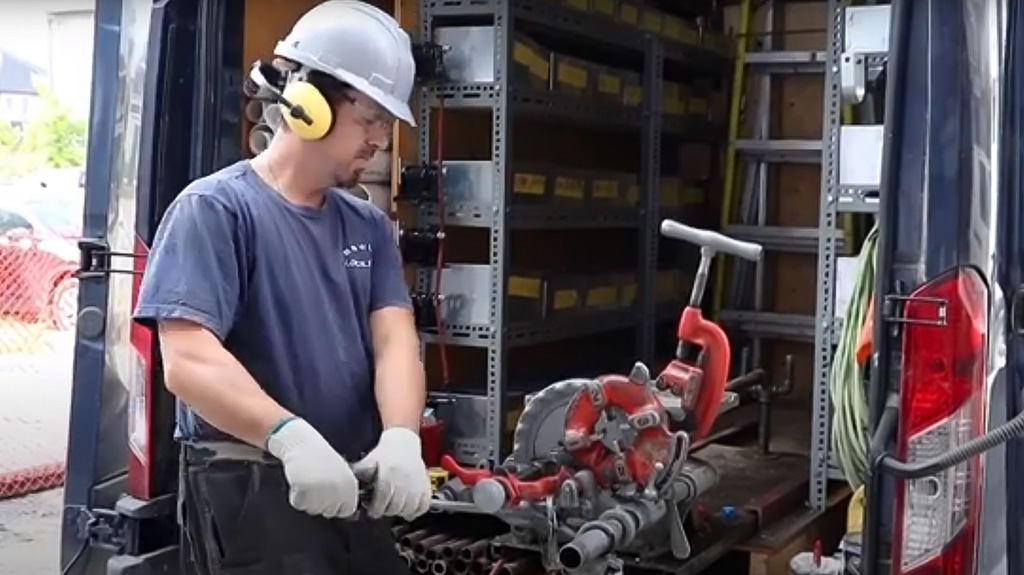The demand for gas fitters should remain strong for years to come despite concerns expressed about the role of the trade in the future, says an executive for the Ontario Pipe Trades Council.
During the recent Mechanical Contractors Association of Canada (MCAC) convention, it was suggested gas fitters could become victims, to some extent, of the decarbonization movement.
This could be the case in residential especially, given the switch to heat pumps from oil and gas heating systems.
Gas fitters in Ontario must be certified to work with gas lines and equipment by the Technical Standards and Safety Authority.
There are three levels of certification tickets that can be earned by gas fitters in the prov-ince, with some in the residential sector earning only that certification and no other trade and working for gas companies.
Many in the ICI sector add a gas fitting licence to their steamfitting, plumbing, HVACR (heating, ventilation, air conditioning and refrigeration) or other papers.
On the ICI side, many are members of the UA trade union.
Brad Hill, the Pipe Trades Council’s business manager, cited numerous examples of a healthy job market. Every new subdivision has gas lines being built, he pointed out, and the natural gas plants in Ontario that are intended to produce energy in off-peak periods are running hard as the demand for electrification in the province increases.
Gas fitters are hard at work across the province installing lines for gas ranges, fireplaces in residences, medical applications and much more, Hill commented.
“I don’t see the demise of the gas fitter anytime in the near future,” he said.
ICI is a continuing source of work for gas fitters, Hill said, citing hospitals in particular, and given the uncertainty surrounding future energy technology in residential — the gas sector, for example, is exploring introducing higher hydrogen blends into the natural gas system — he believes there will be lots of work on that side as well.
“Every house is going to have a gas meter,” he said.
“My own personal opinion is that they will come up with a way to bury the carbon before they eliminate natural gas.”
At the MCAC conference speaker Christine Gustafson of Harbourgreene Consulting referred to gas fitters in noting that Clean Energy Canada estimates while jobs in the fossil fuel energy sector are set to shrink by 0.5 per cent every year out to 2030, jobs in the clean energy sector are set to grow 3.4 per cent annually over the next decade.
Meanwhile, BuildForce’s 2023 Ontario Construction and Maintenance forecast predicted steady employment for gas fitters over the next decade.
Executive director Bill Ferreira told delegates at the convention that BuildForce is currently undertaking further analysis of future demand for trades that will be affected by the green transition. The task of forecasting is difficult, he said in an interview, because of the technical uncertainties.
“If we can convert 40 per cent of existing homes by this date, here’s how many workers we’re going to need to be able to achieve that goal…So it’s a hypothetical scenario as opposed to a real scenario,” he said.
“If hydrogen becomes more of a common fuel for heating, or for steam generation, gas fitters are still going to be required.”
It’s a fluid market, Ferreira said, and the transition is very much at the inception point, not the end point. But the preferred solution in residential seems to be heat pumps.
“There’s still going to be an application for gas fitters for some time to come,” he said. “It’s mostly at the residential level, those are the workers that we would be most concerned about, not those that are involved in commercial, and most commercial gas fitters would have multiple tickets.”
The engineering firm Burns & McDonnell summed up the uncertainty in a blog post.
“Just what will a carbon-free future look like? The answer is constantly evolving, but in the meantime, odds are high that gas will help bridge to that future.”
Follow the author on Twitter @DonWall_DCN



Recent Comments